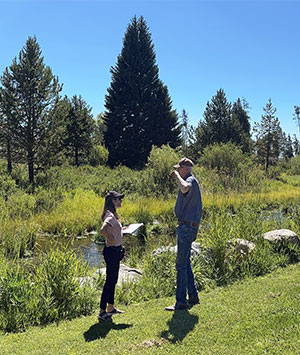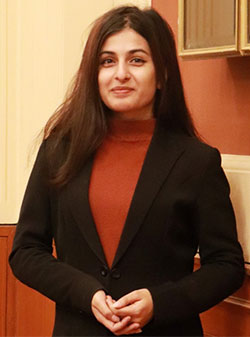Rivers of Resilience: UW Grad Student Takes Deep Dive Into Relationship With Rivers and Lakes
Published July 22, 2024

If you think about water, what is the first thing that comes to mind? Do lakes and streams evoke memories of boating with buddies and fly fishing with friends? Or is the necessity of watering your crops and garden a primary concern?
“Even people whose business and livelihood rely on water availability, such as ranchers or river guides, will eventually talk about their personal experience and emotional connection to being around or on water over the course of a conversation,” says Pallavi Pokharel, a recent University of Wyoming graduate in environment, natural resources and society.
Understanding how Wyomingites think about and relate to water is the topic of Pokharel’s master’s thesis. For this, she interviewed 43 farmers/ranchers and recreationists in the Snake River and Green River basins. Her research is one component of UW’s WyACT: Wyoming Anticipating Climate Transitions project, a five-year program funded by the National Science Foundation, and she is one of the first graduates to come out of the project.
Pokharel had already studied water issues for her undergraduate degree in environmental science in her home country of Nepal. For example, she examined groundwater pollution with arsenic and chemicals and its effects on the city of Kathmandu.
Looking for a master’s program, Pokharel came across a posting for a research assistant for Corrie Knapp, an associate professor in UW’s Haub School of Environment and Natural Resources, and came to UW in summer 2022. The transition from the bustling metropolis of Kathmandu with its 1 million inhabitants to small-town Wyoming was quite a culture shock.
“Laramie is so quiet” was her first impression, but the Haub School faculty and other graduate students were very welcoming, and there is even a Friends of Nepal student association at UW. Having been active in various organizations since her youth, Pokharel immediately looked for ways to get involved with the community, and the new WyACT project turned out to be ideal. The project involves science and modeling, but understanding values and relationships also is an important component.
As a scientist with a deep interest in the impact on humans and their health, she branched out into social sciences methods. Together with her adviser, Knapp, Pokharel decided that, for listening to people in whose lives water plays a central role, hourlong interviews with minimal prompts would be the ideal format.
“We chose this storytelling format to get a full and accurate picture of the perceptions and values behind people’s connection to water,” Knapp says. “It gave us the chance to hear firsthand about how history, culture and other values have shaped people’s relationships to water -- and about any changes they may be noticing.”
In telling these stories, participants were able to reflect and share knowledge. The team hopes that these activities also will build up residents’ ability to adapt to changes, which is central to WyACT’s mission. Pokharel employed digital media as a vehicle for more widely sharing the stories.

While she initially was a bit wary of conducting interviews as a nonlocal, Pokharel was always received cordially. Ranchers shared their generation-spanning love of the land, and recreationists invited her on river tours. She concluded that her outsider status was even an advantage because she approached the topic and interviewees free from bias and preconceived notions.
“The feelings that we share for nature are the same all over the world. We tend to take care of what we admire and connect to emotionally,” Pokharel says. “I believe sharing stories has the power to shape the future of Wyoming’s water resources.”
She hopes to see future infrastructure projects, such as the construction of dams, take into account not just the economic calculations, but also social indicators. Current laws and regulations define water’s beneficial use solely in terms of its economic importance.
Pokharel is one of two recipients of the Haub School Outstanding Graduate Award for spring 2024.
The stories are accessible via StoryMaps, a tool that combines location data with photos provided by the interviewees, text and audio to visualize information across a landscape. To view the stories, go to https://storymaps.arcgis.com/collections/2848668a52c544d6a9fdea7772e85cb7.
Pokharel keeps contacts to Nepal but is starting her research career at UW. She accepted a position as a research professional in the School of Energy Resources in June and continues to focus on social science research and community engagement, now with the intent to ensure environmental justice in communities affected by mining.

